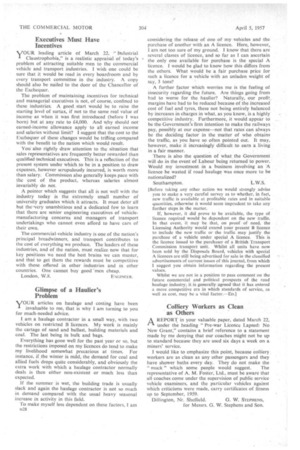Glimpse of a Haulier's Problem
Page 68

If you've noticed an error in this article please click here to report it so we can fix it.
VOUR. articles on haulage and costing have been I invaluable to me, that is why I am turning to you for much-needed advice.
am a haulage contractor in a small way, with two vehicles on restricted B licences. My work is mainly the cartage of sand and ballast, building materials and coal. The last being in bulk and bags.
Everything has gone well for the past year or so, but the restrictions imposed on my licences do tend to make my livelihood somewhat precarious at times. For instance, if the winter is mild, the demand for coal and allied fuels drops quite considerably, and obviously the extra work with which a haulage contractor normally deals is then either non-existent or much less than expected.
If the summer is wet, the building trade is usually slack and again the haulage contractor is not so much in demand compared with the usual heavy seasonal increase in activity in this field.
'To make myself less dependent on these factors, I am 028 considering the release of one of my vehicles and the purchase of another with an A licence. Here, however, I am not too sure of my ground. I know that there are several classes of licence, and so far as I can ascertain the only one available for purchase is the special A licence. I would be glad to know how this differs from the others. What would be a fair purchase price for such a licence for a vehicle with an unladen weight of say, 3 tons?
A further factor which worries me is the feeling of insecurity regarding the future. Are things going from had to worse for the haulier? Naturally, our profit margins have had to be reduced because of the increased cost of fuel and tyres, these not being entirely balanced by increases in charges in what, as you know, is a highly competitive industry. Furthermore, it would appear to be the Government's 'firm intention to make the railways pay, possibly at our expense—not that rates can always be the deciding factor in the matter of who obtains the traffic, as you have so often pointed out. It may, however, make it increasingly difficult to earn a living in a fair manner.
There is also the question of what the Government will do in the event of Labour being returned to power. Would my investment in a business involving an A licence be wasted if road haulage was once more to be nationalized?
Southampton. L.W.S.
[Before taking any other action we would strongly advise you to make a very careful survey as to whether, in fact, new traffic is available at profitable rates and in suitable quantities, otherwise it would seem imprudent to take any further steps in the matter.
If, however, it did prove to be available, the type of licence required would be dependent on the new traffic. In that event, it may be that, on proof of need, the Licensing Authority would extend your present B licence to include the new traffic or the traffic may justify the purchase of a vehicle under special A licence. This is the licence issued to the purchaser of a British Transport Commission transport unit Whilst all units have now been sold by the Disposals Board, vehicles with special A licences are still being advertised for sale in the classified advertisements of current issues of this journal, from which I suggest you obtain information regarding the present values.
Whilst we are not in a position to pass comment on the future commercial and political prospects of the road haulage industry, it is generally agreed that it has entered a more competitive era in which standards of service, as well as cost, may be a vital factor.--ED.1
















































































































